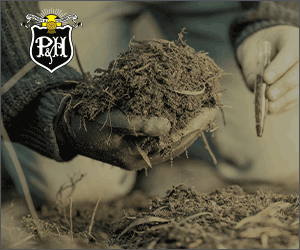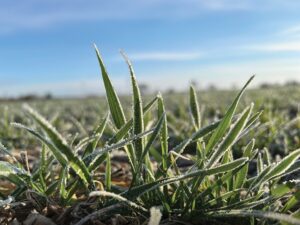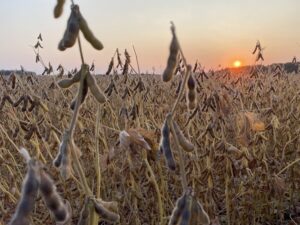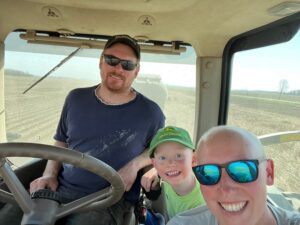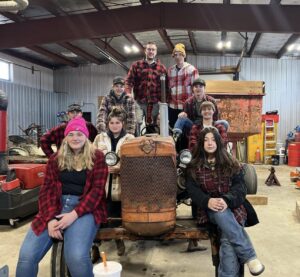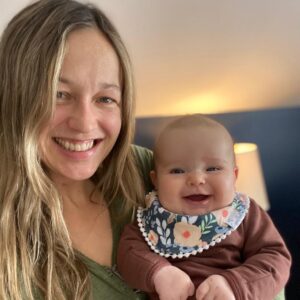The globetrotters
YOUNG FARMERS’ ADVENTURES TAKE THEM AROUND THE WORLD
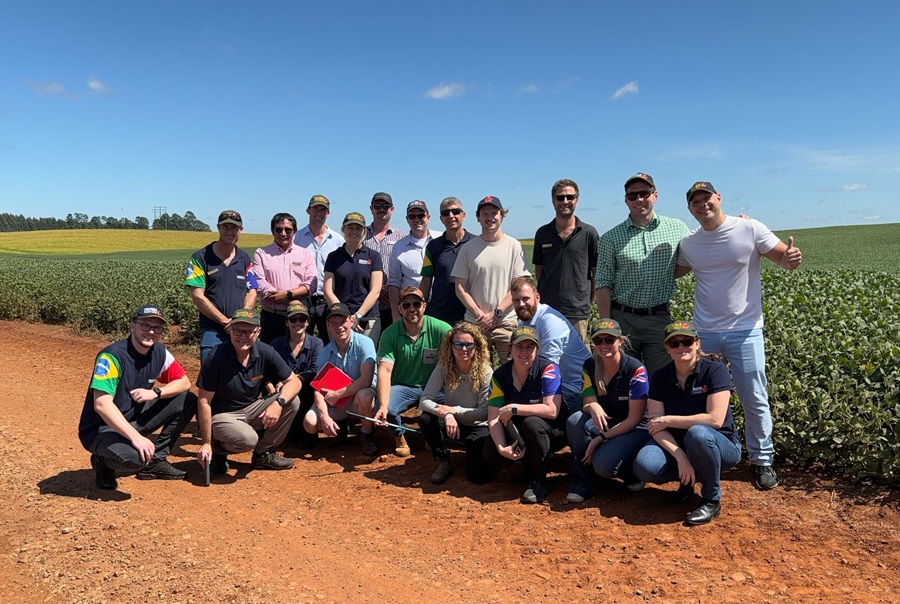
PEOPLE CHOOSE TO TRAVEL FOR DIFFERENT REASONS. For some, travel provides a much-needed diversion from everyday life. For these travellers, comfort, rest, and relaxation are the biggest goals. For others, travel is less about the ‘getting away’ and more about the ‘going to.’ For this group, travel is likened to exploration, where the main objectives are meeting new cultures, gaining fresh perspectives, and learning something new. While the final destination is the goal, the ‘why’ that drives travel is arguably more important. It is, after all, what drives the traveller to move beyond their comfort zone.
This year, four Ontario farmers set off into the world, each with a similar goal: to bring back knowledge and expertise that will help to improve their agricultural communities. Two were awarded Nuffield Scholarships; their travels have just begun. The other two travelled to Nepal in February to see first-hand what faith and charity can do for families in need.
LAUREN BENOIT
When Lauren Benoit, technical solutions agronomist at Bayer CropScience and District 8 (Huron) delegate, received the news that she was one of six recipients of a 2024 Nuffield Scholarship, she already knew the benefits of travel abroad. Benoit, who grew up on a small grain farm near Exeter, Ontario, completed a bachelor of science at the University of Guelph. She then went on to do a master’s degree at the University of Guelph Ridgetown Campus under Dr. Peter Sikkema. Funded by Grain Farmers of Ontario, her research focused on the control of water hemp in corn.
Benoit worked for BASF during her undergraduate studies, assisting in crop protection research and development. Following her studies, though, she was ready for a new challenge.
“When I was leaving grad school, my two thought processes were either I would do something that I already knew how to do — so small plot field research — and go far away to do it, or I would stay in Ontario and do something a little bit different,” she says.
Benoit didn’t have to wait long before an opportunity came her way. Following grad school, she was offered a six-month contract working on a BASF research and development farm in Australia, where she learned a lot about different production systems under Australia’s unique conditions. She stayed in Australia for the entire year and spent time seeing the rest of the country and touring different farming operations.
“It was really right at the edge of my comfort zone,” she says. “I had a hugely good experience.”
Benoit expects her Nuffield Scholarship to take her even further from the comfort of home.
Her study will focus on understanding research collaborations between public, private, and industry groups to leverage research dollars and knowledge transfer more effectively across organizations.
“As provincial or federal research dollars get a little bit tighter, we’re going to need to make sure we’re using them as efficiently as possible,” she says.
The program has already taken her to Brazil, where she saw already noted differences in corn and soybean production. She plans to travel to the Netherlands, the U.K., and back to Australia.
“International travel is very good for forcing you to challenge some of your beliefs or opinions,” Benoit says. “You really start to realize how small your world actually is.”
“Bayer has been fantastic to me as an employer and exceeded all my expectations when it comes to the amount of support they’ve provided to let me do this project,” she adds.
Benoit is the recipient of the Grain Farmers of Ontario Nuffield Scholarship.
MATT MCINTOSH
As a grain farmer and an outdoor enthusiast, Matt McIntosh has long been interested in finding ways to preserve ecologically or culturally important spaces without impacting the viability of local farmers. This interest inspired him to apply for a Nuffield Scholarship in 2023. He was selected to pursue this research interest in the autumn of that year.
Among other places, that curiosity took him all the way to Rathcroghan — a small area in County Roscommon, Ireland, where the community found a way to support local farmers while better conserving archaeological sites on their land.
After an archaeologist colleague suggested he investigate the area because of its critical cultural importance, McIntosh travelled to Rathcroghan to learn more about how the conservation scheme works. Decades of regulations restricting what farmers could and could not do on their land made it even harder to sustain a profitable business. To address this problem, a program was launched to help farmers become the caretakers of the culturally sensitive land. The region now boasts more profitable farm businesses, as well as 240 culturally sensitive historical sites ranging in date from the Neolithic (late Stone Age) to the late medieval period.
“I find that in deep southwestern Ontario, the landscape and a lot of the pressures that we have are exactly the same as many different parts of Ireland, including heavy deforestation and biodiversity crises,” he says.
McIntosh works with his family on a small grain operation in Essex County. He earned a political science degree from the University of Guelph, where he gravitated towards food and agricultural issues. He’s also a freelance agricultural journalist who is fond of writing for both farmers and the general public.
His Nuffield Scholarship is only partially complete now, but he’s expressed interest in understanding hedgerow management in the U.K. and looking into game species conservation in Eastern Europe. He also plans to travel to Manitoba to speak with beef farmers who are working on prairie grassland re-establishment.
“I find that we really are struggling to get out of this ‘go big or go home’ mentality and kind of looking at land as a resource to be extracted. I don’t think that’s right,” McIntosh says. “I hope that I can contribute to a cultural shift in terms of how we think about land management.”
CLAYTON REESOR AND LUKAS BURKHOLDER
For most of their lives, Ontario farmers Clayton Reesor and Lukas Burkholder lived just down the road from one another, although they didn’t meet until they joined the same slow-pitch league in the summer of 2022. The two became instant friends.
Reesor and his family grow corn, soybeans, and wheat, as well as retail sweet corn, on a farm near Scarborough. Slowly, they’re adding other produce to the operation, including watermelon, garlic, and tomatoes. Burkholder and his family grow 3,000 acres of corn, wheat and soybeans and custom harvest another 3,000 acres. While his family is based in Markham, they also farm land near Pickering and Scarborough.
For as long as Reesor and Burkholder can remember, their families have been involved in charitable growing projects through the Canadian Foodgrains Bank (GFGB), a faith and farmer-based organization. But they had no idea where the funds ended up and whose lives they were impacting.
The program is unique in the way it gathers funds. Participating growers set aside a field on which they produce a crop for charity. Proceeds go directly to Canadian Food Grains Bank projects that help families in need around the world.
“Grain farmers are the main contributors to the charity,” says Burkholder.
The pair only recently learned more about the charitable work and its impact. Burkholder had heard about a learning tour where farmers participating in the grow projects could apply to take part in a learning tour. He reached out to Reesor to see if he’d like to apply to join him. They were both accepted and headed off to Nepal for two weeks in February 2024.
The learning tour has several aims. The first is to show CFGB project participants first- hand where their funds go. Participants, 10 in total on this tour, return with newfound insight into the challenges farm families face in developing nations and with an incentive to promote the program to their fellow farmers.
In Nepal, most of the families Burkholder and Reesor visited struggle to put a nutritious meal on the table, especially in the winter months.
“Many farmers don’t grow enough food or make enough money selling their produce to feed their family a high-quality diet until the next harvest comes around,” Burkholder explained.
One of the programs that was put in place by local partner agencies was the establishment of women’s groups. Members are offered training funded by the charity, where they learn the importance of a nutritionally sound diet and how to achieve it. One of the solutions is to teach members how to grow a “kitchen garden” that provides fresh produce year-round.
“The locals seemed very happy with the programs and help that was being offered to them, and one of the biggest takeaways from the trip for me was the willingness of the Nepali people to learn from us and how humble and welcoming they were towards our group,” Burkholder says.
Reesor was also impressed by the impact the CFGB projects had on rural communities in Nepal. Charity funding was used to purchase or subsidize tools for forage chopping for livestock feed and mills for grinding flour.
“Another project that stood out to me was the building of concrete reservoirs to collect and hold water for irrigation, something that made a large impact on the dry, terraced farms,” he says.
Both Reesor and Burkholder plan to share what they saw with their community back home. They believe doing so will drive continued interest in supporting the valuable work. •


